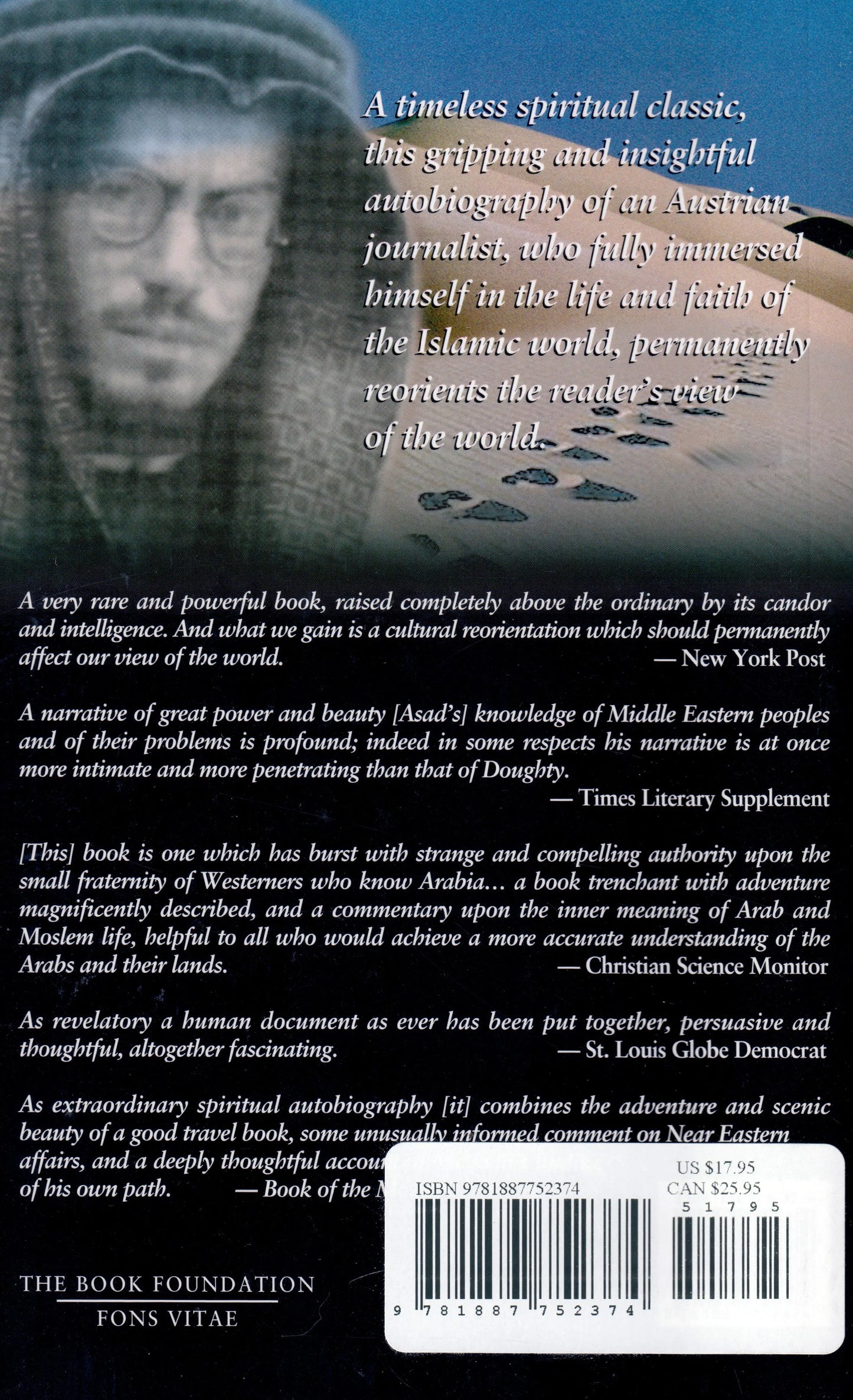A timeless spiritual classic, this gripping and insightful autobiography of an Austrian journalist, who fully immersed himself in the life and faith of the Islamic world, permanently reorients the reader's view of the world.
Within a few paragraphs of this extraordinary and beautifully written autobiography, the reader recognizes he is immersed-profoundly so--in a timeless spiritual classic. 'Ultimate questions' do not vary over time; Asad's insightful elucidation of these concerns and his inspiring personal solutions deeply move both heart and mind.
In common with so many, Asad had "drifted into a matter of fact rejection of all institutional religions." He yearned for a life without the "carefully contained, artificial defenses which security-minded people love to build up around them," where he could find for himself "an approach to the spiritual order of things." He wondered if the European way of life-based on the betterment of economic and political conditions "was in its fundamentals, the only possible way."
He had the courage to look elsewhere.
The grandson of a Central European Orthodox rabbi, Asad found his first "quiet gladness" in Taoism where truths were as a window opening onto a long lost home far from "all narrowness and self-created fears." Asad regretted this "ivory tower" could not be lived in.
Against his father's wishes he left the pursuit of a doctorate in Vienna to take up journalism. His fascinating travels took him to Jerusalem, Arabia, and India, and finally into service at the United Nations. In 1926 Asad embraced Islam. His account of his years in Arabia, his desert adventures, friendship with King Saud, and marriage there is truly gripping while being a great read set against the fascinating background following the first World War.
A timeless spiritual classic including rare period photographs. This gripping and insightful autobiography of an Austrian journalist, who early in the 20th century fully immersed himself in the life and faith of Arabia, permanently reorients the reader's view of the world we live in.
"A very rare and powerful book, raised completely above the ordinary by its candor and intelligence… And what we gain is a cultural reorientation which should permanently affect our view of the world."
--New York Post
"A narrative of great power and beauty [Asad's] knowledge of Middle Eastern peoples and of their problems is profound; indeed in some respects his narrative is at once more intimate and more penetrating than that of Doughty."
--Times Literary Supplement
"[This] book is one which has burst with strange and compelling authority upon the small fraternity of Westerners who know Arabia...a book trenchant with adventure magnificently described, and a commentary upon the inner meaning of Arab and Moslem life, helpful to all who would achieve a more accurate understanding of the Arabs and their lands."
--Christian Science Monitor
"As revelatory a human document as even has been put together, persuasive and thoughtful, altogether fascinating."
--St. Louis Globe Democrat
"As extraordinary spiritual autobiography [It] combines the adventure and scenic beauty of a good travel book, some unusually informed comment on Near Eastern affairs, and a deeply thoughtful account of one man's finding of his own path."
--Book of the Month Club, New York
"As suffused with Arab lore as Sir Richard Burton and almost as adventuresome as T.E. Lawrence, Muhammad Asad offers a similar blend of daring action and thoughtful observation. In addition, he surpasses either of these great predecessors as a prose stylist and interpreter of the Islamic faith."
--New York World-Telegram & Sun
"Asad is a mystic. Many passages assume a striking, unearthly quality."
--St. Louis Post Despatch
About Author:
Muhammad Asad, born Leopold Weiss; 2 July 1900 – 20 February 1992) was a Jewish-born Austro-Hungarian journalist, traveler, writer, linguist, thinker, political theorist, diplomat and Islamic scholar. Asad was one of the most influential European Muslims of the 20th century.
By the age of thirteen, young Weiss had acquired a passing fluency in Hebrew and Aramaic, other than his native languages German and Polish. By his mid-twenties, he could read and write in English, French, Persian and Arabic. In Palestine, Weiss engaged in arguments with Zionist leaders like Chaim Weizmann, voicing his criticism of the Zionist Movement.After traveling across the Arab World as a jourrnalist, he converted to Islam and chose for himself the Muslim name "Muhammad Asad"—Asad being the Arabic rendition of his root name Leo (Lion).
During his stay in Saudi Arabia, he spent time with Bedouins and enjoyed close company of Ibn Saud—the founder of modern Saudi Arabia. He also carried out a secret mission for Ibn Saud to trace the sources of funding for the Ikhwan Revolt. Due to these activities, he was dubbed in a Haaretz article as "Leopold of Arabia"—hinting similarity of his activities to those of Lawrence of Arabia.
In 2008, the entrance square to the UN Office in Vienna was named Muhammad Asad Platz in commemoration of his work as a "religious bridge-builder". Asad has been described by his biographers as "Europe's gift to Islam" and "A Mediator between Islam and the West".




